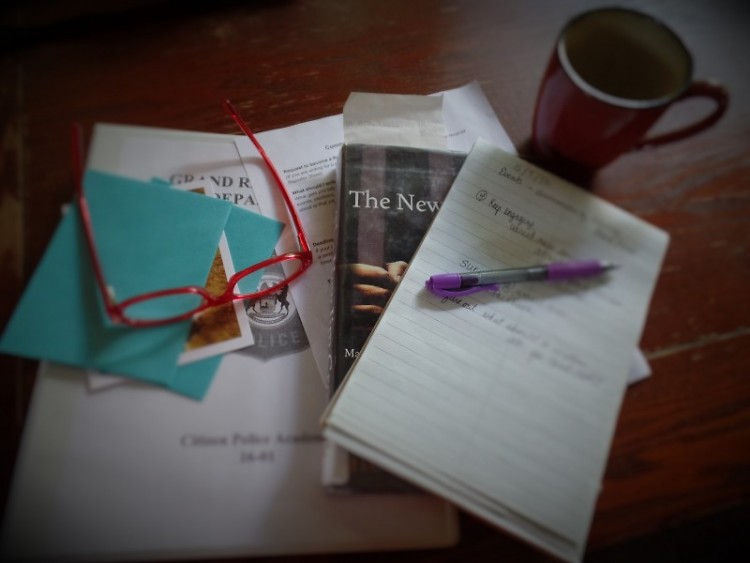On the evening of Tuesday, September 13, 2016, the citizens of Grand Rapids found themselves with several options for engaging with community. This is not unusual. As the school year begins, many of us settle into a routine that may include sports, church groups, or interest-based gatherings such as knitting or hunter safety. The local libraries, bookstores, and non-profits are full of small groups: people with their coffee and handouts, curious to explore their interests alongside their neighbors. In addition, people on their mobile devices and computers find their neighbors on social media to discuss issues.
On this particular Tuesday night, the Grand Rapids Police Department hosted the first class of the Citizens Police Academy for 2016. I attended, along with about 20 others. We conversed with top brass about the department’s new community representation recruiting initiatives and the gentrification of the south side of Grand Rapids, particularly around Wealthy and Cherry streets.
On this particular Tuesday night, in the exact area we mentioned at the Citizens Academy, Showing Up for Racial Justice, an organization I'm a member of, hosted an event called “We Can Do Better, Part 2: White Ignorance and White Fragility,” with guest facilitator Dr. Mike Lorr, Associate Professor of Sociology at Aquinas College. Unable to be in two places at once, I messaged briefly with organizer Marie-Claire Camp afterward. She said, “We talked about Forest Hills, about Whiteness, about White fragility, and symbols of White supremacy. We talked about holding the Forest Hills kids accountable for their actions, not having adults speak for them.”
On this particular Tuesday night, commenters on the Facebook page of Michael Scruggs, Democratic Candidate for Kent County Sheriff, were discussing whether the Hillary Clinton campaign is doing enough to support black candidates and not just counting on the black vote to deliver the city of Grand Rapids. I invited a committed party worker to attend SURJ events and learn more about current racial equity work.
Grand Rapids neighbors came together to support people in other parts of the nation as well. The Anishinaabe Circle hosted a taco dinner fundraiser to stand in solidarity and to increase awareness to stop the Dakota Access Pipeline, and a letter-writing campaign to support Chelsea Manning took place at The Lantern.
Looked at closely, the wealth of community options on any given Tuesday night may be showing us something. Perhaps the narrative in this city is slowly starting to change. Certainly, more residents are recognizing of the need for change, as Forbes magazine recently ranked Grand Rapids as one of the worst cities for African-Americans in economic terms.
If there is a slow change in the narrative, it is fueled in part, I believe, by greater progressive participation inspired by the Bernie Sanders campaign, as well as grave concern over national events involving police shootings of people of color. It may also be fueled by greater access to different perspectives via social media and via citizen journalism in The Rapidian.
As the second-largest city in a state that is known for its role in the fight for equality on many fronts -- as a city that is known for conserving community and cultivating compassion -- as a city that wants to invite in more art and more innovation, which in turn requires more diversity -- Grand Rapids needs to be ready for these more open conversations between folks with wildly different perspectives.
As the SURJ Facebook page says, these conversations will be awkward and sometimes painful, but they are necessary. We will need to take a breath and be willing to be wrong. We will need to learn how to see through another’s eyes. Those of us who have lived with unrecognized privilege and protection will need to listen. It will be uncomfortable. And I am quite sure that with a lot of work we can see each other through it.
One cup of coffee at a time.
The Rapidian, a program of the 501(c)3 nonprofit Community Media Center, relies on the community’s support to help cover the cost of training reporters and publishing content.
We need your help.
If each of our readers and content creators who values this community platform help support its creation and maintenance, The Rapidian can continue to educate and facilitate a conversation around issues for years to come.
Please support The Rapidian and make a contribution today.
